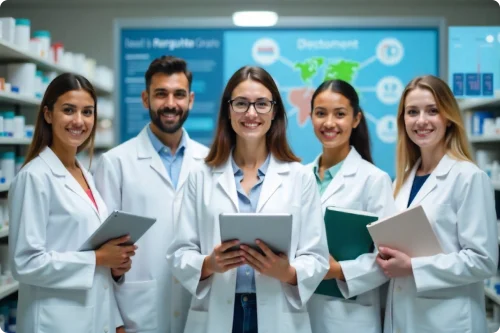ERP LMS for Pharmacy Colleges : Building Skilled and Industry-Ready Pharmacists
Introduction
The ultimate mission of every pharmacy college is to shape students into professionals who are ready to thrive in the healthcare and pharmaceutical industries. Many graduates leave college with strong theoretical knowledge but limited exposure to practical applications, internships, and career guidance.
An ERP LMS for Pharmacy Colleges bridges this gap by providing tools for personalized learning, structured internships, career placement support, and continuous professional development. It ensures that students are not only academically sound but also industry-ready from day one.
This is where a robust ERP LMS system becomes indispensable. With modules designed to integrate academics, administration, and industry preparation, solutions like vmedulife ERP LMS help pharmacy colleges build skilled, industry-ready pharmacists who can confidently meet modern healthcare demands.
1. Centralized Academic & Laboratory Management
In pharmacy education, laboratories play as important a role as classrooms. A modern ERP LMS offers a centralized academic planning system combined with lab and practical tracking. Institutions can schedule lab sessions, manage experiment logs, and ensure compliance with safety protocols. Features like Assignment Management and Online Exam Software further enhance student accountability and academic rigor. For pharmacy colleges, this integration ensures students can seamlessly balance theory with practical learning, while faculty gain transparency in evaluating performance. Centralized record-keeping also simplifies audits and accreditation processes, making academic and lab management more efficient.
2. Enhanced Student Engagement Through LMS
Pharmacy students need continuous engagement to excel in both academics and clinical applications. ERP LMS platforms provide interactive learning tools, rubrics-based evaluation, and mentoring modules that help track individual progress. With access to digital resources, students can study pharmaceutical case studies, clinical trials, and drug research on the go. Online examinations and real-time feedback give learners immediate insights into their strengths and areas for improvement. Such features encourage participation, ensure consistent progress, and equip pharmacy students with critical thinking skills required by industry and healthcare organizations.
3. Research & Innovation Support
Pharmacy colleges often serve as hubs for research and innovation in drug development, pharmacology, and healthcare technology. ERP LMS supports this with Researcher Profiles, Digital Resource Libraries, and Data Analytics Tools. These modules provide structured access to research projects, publications, and lab data. By centralizing research information, institutions can collaborate more effectively and present verifiable outputs to funding bodies, industry partners, or accreditation councils. For students, the platform nurtures a culture of inquiry and innovation, helping them engage in projects that mirror industry demands and enhance their readiness for advanced roles.
4. Placement and Career Readiness
One of the biggest challenges for pharmacy colleges is ensuring that graduates are industry-ready. The Training & Placement Management module within ERP LMS allows institutions to manage recruiter interactions, campus drives, and student applications seamlessly. By integrating academic records with placement data, recruiters can quickly evaluate candidates, while students can access job postings and track offers in real time. This transparent, digital-first approach not only improves placement success but also boosts institutional credibility with healthcare companies, pharmaceutical firms, and research organizations. Ultimately, ERP LMS bridges the gap between pharmacy education and employability.
5. Administrative and Compliance Efficiency
Beyond academics, pharmacy colleges must handle admissions, fees, HR, transport, and hostel management—tasks that consume significant resources. ERP systems automate these administrative functions, improving efficiency and reducing errors. Modules like Fees Management, IQAC Reporting, and Grievance Redressal enhance accountability while ensuring compliance with regulatory bodies. This integration of academic and administrative functions allows colleges to focus more on their core mission—producing skilled pharmacists.
The Skill Gap Challenge
The pharmaceutical industry requires graduates with a blend of technical knowledge, practical training, and soft skills. Unfortunately, many students face difficulties due to :
Minimal exposure to real-world pharmaceutical practices.
Lack of structured guidance during internships.
Limited opportunities for skill development beyond academics.
Gaps in career support and industry networking.
Colleges need a system that prepares students for the workplace while still in school.
Personalized Learning for Competency Building
An ERP LMS for Pharmacy Colleges ensures that every student receives tailored learning opportunities by :
Offering adaptive assessments that highlight individual strengths and weaknesses.
Allowing faculty to assign personalized resources.
Tracking competency-based learning outcomes.
Providing additional support materials for slow learners.
This helps students achieve both academic excellence and workplace readiness.
Structured Internships and Training
Internships form the foundation of hands-on learning in pharmacy education. ERP LMS manages this critical aspect by :
Internship Allocation : Assigns students to appropriate training sites.
Performance Tracking : Records mentor evaluations digitally.
Feedback Integration : Faculty can monitor and guide students during training.
Documentation : Stores internship reports for academic and career purposes.
Students gain practical exposure while colleges maintain oversight and quality assurance.
Career and Placement Support
Finding the right job after graduation can be daunting without proper support. ERP LMS assists by :
Maintaining a recruiter database for campus placements.
Scheduling placement drives and interviews.
Storing resumes, portfolios, and student achievements.
Tracking placement statistics for institutional performance.
Continuous Professional Development
The pharmaceutical sector evolves rapidly with new technologies, regulations, and innovations. ERP LMS ensures students and alumni remain updated by :
Offering online certification courses.
Hosting webinars with industry leaders.
Providing access to the latest research and developments.
Maintaining alumni networks for lifelong learning.
This helps graduates remain relevant and competitive in their careers.
Enhancing Student Experience
Beyond academics and careers, ERP LMS improves the overall student journey by :
Offering transparent dashboards for academic progress.
Sending timely reminders for assignments and exams.
Allowing easy communication with faculty.
Providing career counseling resources digitally.
The result is a stress-free, engaging, and supportive learning environment.
Conclusion
It demands a holistic system that integrates academic excellence, hands-on training, and career support. An ERP LMS for Pharmacy Colleges fulfills this need by building a foundation for industry-ready pharmacists. For colleges that aim to stand out as career-focused institutions, adopting ERP LMS is a long-term investment in both student success and institutional growth.

